Text of Ethics Complaint Filed Against Representative Todd Jones Regarding HB520
Complaint Filed Monday, April 10, 2023
Ethics Complaint Regarding Representative Todd Jones for Unethical Acts Committed During the 2023 Georgia General Assembly and Before
Complainant: Henry G. Sullivan, III, Citizen of the State of Georgia
April 10, 2023
The Complaint
Pursuant to Georgia House Ethics Rule 164.1(A)(ii), as a member of the public, I, the undersigned, allege Representative Todd Jones is guilty of multiple counts of improper conduct in his role as a Georgia Representative during the 2023 General Assembly and before, to wit:
1. In violation of GA Code § 45-10-90, as a member of the Georgia General Assembly, Representative Todd Jones of Georgia’s 25th District sponsored legislation in which he had multiple interests and used his official position as an elected representative in the Georgia Legislature to exploit that position for his own direct, unique, pecuniary, and personal benefit.
2. Recognizing the violation of GA Code § 45-10-90 above, as a Member of the Georgia House of Representatives, Representative Todd Jones violated House Ethics Rule 171.1, which requires: “No member or employee of the House shall unlawfully use his or her office or official position for personal financial gain.”
3. In violation of House Ethics Rule 171.1, Representative Todd Jones engaged in improper conduct, as defined under House Ethics Rule 164.1(A)(i)(c) to mean conduct that is a “conflict of interest,” the term, “conflict of interest,” as defined under House Ethics Rule 164.1(A)(i)(b) to mean, “an individual has multiple interests and uses his or her official position to exploit, in some way, his or her position for his or her own direct, unique, pecuniary, and personal benefit.”
4. In violation of House Ethics Rule 171.1, Representative Todd Jones engaged in improper conduct by recruiting other elected Georgia legislators to become equity partners in his firm, unbeknown to them of unethical acts and methods he would undertake, eventually causing each recruited legislator to experience potential conflicts of interest as well, as defined under House Ethics Rule 164.1(A)(i)(c) above, unavoidably resulting in legislators unknowingly voting on legislation, the favorable outcome of which could benefit them financially. There are no allegations of improper conduct in this complaint by any other past or present members of the Georgia Legislature.
5. In violation of House Ethics Rule 171.9, the facts below demonstrate that Representative Todd Jones, effectively operating under dual roles, that of State Representative for the people of the 25th District, and that of de facto lobbyist for the firm he chairs, failed to register or disclose in any way his role as a lobbyist for his Talitrix firm, in discussing the promotion of the passage of legislation by the General Assembly, including committees thereof, and without wearing a valid official registered lobbyist badge.
6. In violation of House Ethics Rule 164.1(A)(i)(c), by sponsoring HB520 Representative Todd Jones sought to pass legislation which would not only serve his own pecuniary interests, but also potentially harm individuals who as a result would have been subjected to unconstitutional private influence and/or control over governmental authorities, which is an abuse and misuse of official power as a legislator. Under HB520, Jones’ private technology and proprietary artificial intelligence programming would heavily influence, to the point of controlling, the nature and severity of individualized service plans forced by the government upon clients of the mental health system, resulting in private gain for his company.
7. In violation of long-established principles of law, and in conflict of the interests of his elected office, in his sponsored legislation Representative Todd Jones attempted to wrongfully immunize his company from justified civil or criminal liability which might result from the use of his firm’s proprietary artificial intelligence and predictive analytics software, the end result of which could provide potentially harmful service plans to clients enrolled under the authorities of HB520.
I, therefore, respectfully request the House Committee on Ethics to:
1. To conduct a full investigation and hold hearings where a preliminary inquiry subcommittee may determine that this complaint discloses substantial evidence of unethical or improper conduct on the part of Representative Todd Jones, as named in the complaint, as authorized under Rule 164.2;
2. To undertake all actions related to the findings from (1) including reprimand for Representative Jones as authorized under Ethics Rules of Section 164, and report to the appropriate law enforcement agencies any instance in which an investigation by the committee results in a finding of probable cause to believe that a criminal offense has been committed as authorized under Rule 164.6.
Background
On May 5, 2020, registered agent Justin Hawkins filed paperwork to incorporate Talitrix, LLC. The product Talitrix would soon market to law enforcement and criminal justice agencies around Georgia and the country is a sort of “high-tech” ankle monitor, but in the form of an attractive sports watch, which comes to life when Bluetoothed to a smartphone. The purpose of the Talitrix watch is to communicate continuous bio-metric and GPS data concerning the general state-of-being and whereabouts of various individuals released into the community from government facilities associated with agencies partnering with the system.
The patent for the Talitrix monitoring system (see page 8 below and accompanying errata) is in the name of Mr. Hawkins, but also in the names of Robert Todd Jones and Eric Brice Bennett. Of the three, Mr. Jones serves as the Chairman of the Board of Talitrix, LLC, is a major investor in the company as indicated by his 2020 financial disclosure, and is also the Georgia House Representative for the 25th District located in a southern part of Forsyth County.
Although the gentlemen referred above are listed as the system’s inventors, and hold all patent rights to the Talitrix system, the system itself was apparently first designed and produced by Thundercomm Technology Co., Ltd. Located in Chongqing, China. (see errata)
In his role as elected Georgia Representative, during the 2023 General Assembly Todd Jones served as the lead sponsor of HB520. Should that bill have become law with the provisions sponsored by Jones, which passed overwhelmingly (LC 33 9464S) by the Georgia House in 2023 due to Jones’ lobbying efforts, Jones and his partners, some who either were, or are even now elected members of the Georgia legislature, would have stood to gain perpetual enrichment partnering with state and local agencies authorized and funded under HB520’s provisions, Jones’ company, Talitrix, becoming the required supplier of technology, equipment and services for “clients” who Jones’ legislation qualifies requiring “monitoring” under HB520’s provisions. Talitrix would be the required supplier under HB520 because Talitrix is the unique source of technology, equipment and services which could fulfill the requirements written into the bill.
Oral Evidence of Todd Jones’ Intent to Sponsor Legislation Despite Serious Conflicts of Interest
On September 14, 2021, representing Talitrix, Georgia Representative Todd Jones, along with then Georgia 67th District Representative Micah Gravely, met with the Tennessee Joint Subcommittee on Bail Reform to inform its members of their company’s technology and monitoring system, and its potential use partnering with the State of Tennessee. During their sales pitch, both Gravely and Jones detailed to the committee members the design characteristics and specifications of Talitrix technology, its applications for state and local governments, and specifically its applications addressing mental illness, drug addiction, alcohol addiction, pretrial bonding, parole and “in-reach and reentry programs,” or what Representative Jones refers to the Tennessee legislators as, “inside the wire and outside the wire” applications.
In two videos accompanying this complaint, one edited with commentary and one the full video, Representative Gravely begins his sales pitch verbalizing that the problems the legislators are dealing with in Tennessee are the same problems he, Representative Jones and other legislators are dealing with in their home state of Georgia. As examples of those common problems, Gravely asks, “How do you deal with pre-trial? How do you deal with your bonding agents? How do you handle technology and monitoring? How are we dealing with drug courts? How are we addressing this both legislatively at the state and local jurisdictions?” He expresses to the Tennessee legislators listening to their discussions on these topics makes him feel like he is sitting in “some of the Georgia committees” noting that their discussions are the same.
Some may view Representative Gravely’s remarks as a mere sales pitch to sell the Talitrix product, and they would be right. However, viewed within the context of all the facts before us we can also infer with confidence that Representative Gravely believes that the Talitrix solution he proposes for Tennessee is just as appropriate for Georgia, or any state experiencing these problems. Representative Gravely more than suggests these problems are best solved, “legislatively,” in other words by law-making at what he refers, “state and local jurisdictions.” That is because, as we will learn, the Talitrix system requires a large and ever-growing “collaborative” database, in other words, a database which spans across the boundaries of “state and local jurisdictions” in which the system is deployed. That being the case, state-wide legislation would be required for the Talitrix system to be used to its utmost. So here we have two Georgia law-makers, Micah Gravely and Todd Jones, attempting to sell a neighboring state, Tennessee, on the idea of enacting state-wide legislation to partner with Talitrix to use its patented technology, equipment and services to solve the very same problems they as law-makers in Georgia will soon be trying to solve through the legislation we see in HB520.
Next, Representative Gravely informs the Tennessee subcommittee that his company, Talitrix, has already addressed the problems he contends both Tennessee and his home state of Georgia are experiencing. He adds that Talitrix is a “very unique solution” impressing upon the members that only his company and his equipment and services can adequately solve these common problems. That is because no one else has equipment and technology like he and Representative Jones are going to show them. As we will discover, whether Georgia legislators might have understood it when they voted on these bills or not, HB1013 from 2022 and HB520 from 2023, both bills sponsored by Talitrix Chairman and Georgia Representative Todd Jones, were designed to work together as Talitrix “legislative solutions” for Georgia, just as they suggested Tennessee legislators consider in 2021, thus defining a conflict of interest for Representative Jones. The hard evidence leading to that conclusion, as I will demonstrate below, will be confirmed by:
1. comparing the requirements of those bills to the technology, workings, capabilities and requirements of the Talitrix system,
2. comparing the specifications required within those bills to the specifications of the Talitrix patent, and
3. recognizing that the Talitrix system and technology is the unique available option which could fully conform to those specs, forcing a partnership between Talitrix and the State of Georgia to fulfill the law enacted by HB520.
Therefore, once HB520 might become law as sponsored by Representative Jones, the only way to execute that law would be if,
1. the Georgia Department of Behavioral Health and Developmental Disabilities partners with Talitrix to provide technology, monitoring equipment and services described in the bill for the individual clients served by the system, and
2. the Georgia Data Analytics Center (GDAC) provides the infrastructure to combine and maintain a collaborative database collecting continuous streams of data flowing to it from the Talitrix data collection/monitoring system for each client throughout the Georgia jurisdiction.
In short, Representative Jones’ patented system is the unique product, equipment and technology which can meet the specs Representative Jones wrote into his sponsored legislation. Therefore, it is undeniable that Representative Jones intended for his company to provide the monitoring, the data collection, predictive analytics and artificial intelligence necessary to devise individual service plans for every client in the HB520 system, regardless of their mental state or situation, a function which happens to fulfill a primary mandate of the still-active 2010 DOJ Settlement with Georgia, as shown below, requiring, “Monitoring the Individual Service Plan to make additional referrals, service changes, and amendments to the plans as identified as needed,” concerning those individuals the State of Georgia and/or certain local jurisdictions consider either mentally ill, or who as a result of their condition or situation fall under the “mental illness” legal umbrella.
Oral Evidence that Representative Jones Specified the Talitrix Monitoring System “by Describing it” in HB520
There would be two ways for Representative Jones to specify his patented Talitrix device, services, and technology to become legally required under HB520. The first way would be simply prescribe the Talitrix device, services and technology by name in the bill. That would be easy, but also obvious and would make any school child see the conflict of interest. The second way would be to describe the unique features, characteristics, technology, and services of the Talitrix product as requirements which must be fulfilled by the law, while leaving the choice of who might provide them to be determined by the appropriate governmental agencies. That is the method we see used in HB520. HB520 specifies that the unique Talitrix features, characteristics, services, and technology are necessary to fulfill the law. And because Talitrix is the unique firm capable of providing that mix of ingredients to the State of Georgia, the law cannot be fulfilled without Talitrix. Below, we will conclusively demonstrate that HB520 is written employing method two above to specify the Talitrix product knowing that doing so would be an unlawful conflict of interests.
Speaking to the Tennessee Joint Subcommittee on Bail Reform, in the video Representative Jones advises the senators, “One of the things we realized was that there was not enough, ‘business analytics.’” Jones continues, “For those of you in business today, you hear all the time, ‘business analytics, predictive analytics.’” Representative Jones relates those terms to the Tennessee legislators because the Talitrix system is designed to use its proprietary artificial intelligence to provide “predictive analytics” using the data it collects. That fact can be found in the description of Representative Jones’ patent. According to the patent, the Talitrix watch is an “electronic monitoring device.” The patent says the monitoring device “tracks a person’s location.” It “optimizes compliance by tracking key performance indicators and uses “predictive analytics” to adjust compliance programs as they apply to client throughout the system.”
Matching the description illustrated by Jones to the Tennessee legislative committee, and also specified in the Talitrix patent, lines 762-764 HB520 require the Georgia Data Analytics Center (GDAC) to, “Identify ways to ‘use and share’ existing data for business intelligence and predictive analytic opportunities; and Identify strategies to combine internal and external data sources.”
Those requirements on lines 762-764 in HB520 match the unique capabilities of Jones’ patented technology designed into the Talitrix monitoring system. Notice that under HB520, the roll of GDAC would not be to provide predictive analytics “in house,” in other words on the government side of this partnered arrangement. Rather the government side would merely, “use and share” existing data. Thus, the “business intelligence” and “predictive analytics opportunities” required by HB520 would be the job of someone else. Because the only other link in the chain of monitoring, collecting, and transmitting the data to be stored at GDAC would be Talitrix, and because the Talitrix system already includes the artificial intelligence necessary to provide the predictive analytics HB520 requires, should HB520 become law, the Talitrix monitoring system would become both the “exterior data source,” and the provider of “predictive analytics.” Furthermore, HB520 affords the provider of data and predictive analytics, meaning Talitrix, the authority to use and analyze the data it collects in-house for its own purposes, that data providing, “business intelligence.” Because the governmental agencies, including GDAC who receive the data are not conducting “business,” in any sense of the term, “business intelligence” activities could only be conducted by Talitrix. That Representative Jones designed and sponsored legislation specifying his own patented technology, product and services is hereby confirmed, and is thus a conflict of interests on its face.
Talitrix Website Evidence that Representative Jones Specified the Talitrix Monitoring System “by Describing it” in HB520
Consistent with the statements of Representative Jones to the Tennessee Senators, the Talitrix website also provides concrete evidence that lines 762-764 in HB520 refer directly to the patented Talitrix system. According to the website, “If we can provide case managers, Judges and Attorneys with accurate behavioral data (here the website describes Talitrix as an “exterior data source” as specified in HB520) and predictive analytics (Talitrix, rather than GDAC would provide of the predictive analytics as HB520 requires), they can personalize case management and make more informed decisions—granting second chances, without second guessing.” Thus, the Talitrix website is in full agreement with Todd Jones’ representations to the Tennessee legislative subcommittee and the requirements written into HB520, which Jones Sponsored.
Because, as Representative Gravely revealed in Tennessee, Talitrix is “unique,” meaning there is no product other than the Talitrix system which can fulfill the requirements of the legislation Todd Jones sponsored, and because none of the aforementioned could have happened by chance, we have again confirmed that in sponsoring HB520, Representative Todd Jones acted under a shroud of conflicting interests. That said, in the next several pages I will continue to mount evidence which will convince even the most devout skeptic of the truth that during the 2023 General Assembly, Representative Todd Jones attempted to unlawfully legislate the requirement of his own patented technology, equipment and company’s services into law, in essence forcing an extremely profitable partnership with the State of Georgia required to comply with the law he sponsored.
What is “Monitoring?”
Certain Georgia legislators have voiced an opinion that when using the term, “monitoring,” in HB520, Representative Jones meant something other than “tracking.” If there is a difference it is subtle and non-supportive of that contention. The only difference would be that the term, “monitoring,” is inclusive of the term, “tracking,” but not confined to that term. By that, I mean that “monitoring” encompasses all the following: tracking, data gathering, data recording, data analysis and data transfer to GDAC or a local satellite government agency. Essentially, according to its patent, Talitrix “monitors” what it “tracks,” and in the process would provide tracking data to local partnering governmental agencies, Talitrix becoming, as HB520 line 764 requires, an “external data source.” We know that for several reasons. We know monitoring includes tracking because in the Talitrix presentation in Tennessee, Jones’ colleague, Representative Gravely, asks the senators, “How do you handle technology and monitoring?” Well, what does he mean by monitoring? He means exactly what Representative Jones’ patent says, that it is,
“an electronic MONITORING (caps added) device and system that uses a wearable MONITORING (caps added) device in conjunction with an associated smartphone’s location services to TRACK (caps added) a person’s location.”
And it is precisely that patented product Jones attempts to sell the State of Tennessee in the video, a state which he and Representative Gravely contend has the “exact same problems” as their home State of Georgia. Therefore, if the solution for Tennessee requires tracking, so does the solution for Georgia. Thus, an argument that the term, “monitoring,” does not include “tracking” cannot be sustained.
Building on the fact that in HB520 “monitoring” includes “tracking,” we recall that during the 2022 General Assembly Representative Jones also sponsored HB1013. In that mental health bill, the precursor to HB520, Jones specified “tracking” to be one of the activities required under its authorities.
We should notice the consistency in these two bills, HB1013 and HB520, both bills lumping individuals victimized by any number of human frailties under a heading of those “receiving community based mental health services,” thus positively affirming the bill’s sponsor’s intention that individual clients, regardless of the circumstances of becoming a client, would be TRACKED using a GPS tracking device. The problem for Representative Jones last year, however, was that due to public outrage the term, “tracking,” was deleted from the bill.
Thus, in this years’ follow up bill, HB520, sponsored by the same Representative Jones, instead of the term, “tracking,” which last year raised heavy suspicion, the author of the bill rather used, “monitoring.” But as we have seen, it makes no difference. Those terms are synonymous. Talitrix is a monitoring company which monitors what it tracks. Regardless whether any legislator could be led to believe otherwise, viewed in its context and in the authorities of the bill, monitoring can only mean tracking as well.
Taxpayer Funding of Talitrix Contracts
Next, let us look at one source of taxpayer funding for Talitrix technology and services in HB520. Without funding, none of this could happen. Let’s go to lines 167-170, where HB520 refers to “Jail in-reach and re-entry programs.”
We see on those lines that under HB520 the Georgia Department of Behavioral Health and Developmental Disabilities would “establish a grant program with funding and ‘technical assistance’ for one or more counties to create or expand ‘collaborative’ jail in-reach and reentry programs.” That “technical assistance” means Talitrix assistance. It must mean Talitrix because, as Representative Gravely told us, no other firm can provide the patented technology, equipment, and services Talitrix has, and which HB520 requires. Furthermore, the programs established under HB520, (ie. jail in-reach, addictive services, mental health services) are “collaborative” because together each requires a collaborative database among several jurisdictions, local all the way up to the entire State of Georgia. As we have seen, under HB520 the “collaborative database” for the entire State of Georgia would be created and maintained by GDAC. To that purpose, late in the afternoon of the final day of the 2023 Georgia General Assembly, the HB520 provisions authorizing GDAC to use and share data obtained from “external data sources” as shown in the following graphic, were copied and pasted into SB23, and quickly passed by both chambers.
HB520 defines the term, “government information” brought in from lines 343-352 above to mean the following,
Thus, once these provisions in HB520 would be signed into law, GDAC could “receive” and “maintain” data gathered from practically any “external data source,” the one in front of us being Talitrix.
Importantly, once SB23 would be signed by the Governor, GDAC would receive the authority implied to devise and complete the collaborative database infrastructure necessary to begin receiving data once the data collection processes we see in HB520 are passed into law. At the time of this writing, the authorities to build the collaborative database infrastructure are awaiting signature by the Governor.
And so, here again, as we have seen with the other requirements in HB520, the need for a collaborative database and collaborative jurisdictions is unique to Talitrix. Furthermore, we should notice what Representative Jones says to the Tennessee legislators in the full video, that Talitrix is presently in three states. At the time of their 2021 presentation, Jones and Representative Gravely were actively pursuing the deployment of the Talitrix system in a fourth, Tennessee, a neighboring state to Georgia. That is important because once the Talitrix system would be deployed to its fullest among adjoining states, as state-wide legislation like HB520 could help bring about, the jurisdictions defined by those states could also “collaborate,” stitching together a state-by-state tracking grid with the ability to monitor and predict the behavior of individuals, as legally required to be tracked by any local authorities within the geographic boundaries of the resulting jurisdictional footprint. The opportunities for misuse of such a system should be apparent. A law creating these kinds of multi-state jurisdictional authorities, which would be used to pair private operators with collaborative public databases, using public financing, is a dark undertaking presenting serious dangers for a free society. That law stitching together these state-to-state jurisdictions, OCGA § 37-10-2, specifically sections V and VI of the Interstate Compact on Mental Health (see below), is already on the books, and under HB520 could be used to effectively establish a multi-state, or even nationwide Talitrix jurisdictional partnership complete with government-maintained collaborative database, combining every state under the compact into one jurisdiction, only limited in reach by oceans to the east and west, and foreign nations to the north and south.
It is not beyond reason to consider that the resulting combined state-to-state jurisdictional footprint, once established against common foreign borders, could be stitched together to encompass an international Talitrix jurisdictional footprint, with a comprehensive, government-funded and maintained, collaborative database among nations, bordering or not, creating one of the most dangerous tools of control ever devised by man.
Improper Recruitment of Other Georgia Legislators to Enter into Equity Positions and/or Employment with Representative Jones’ Talitrix Firm, Creating Potential Conflicts of Interest
Over time, Representative Jones engaged in improper conduct, recruiting other Georgia legislators to become either silent equity partners, and/or active partners, or employees with his Talitrix firm. As a result, very possibly with no knowledge of the legislation Representative Jones would eventually sponsor, and thus due to no apparent fault of their own, those who Representative Jones recruited, and who remain members of the Georgia General Assembly, now find the themselves living under a cloud of potential conflicting interests as events, including votes forced by Jones in both chambers, have played out.
Furthermore, other now former members of the Georgia House of Representatives, Micah Gravely in the accompanying videos for one, are or were during the interim encompassing recent past legislative sessions, actively employed, and possibly equity partners, working with Talitrix.
Regarding one other House member recruited by Representative Jones to join as an equity partner, I attest that in March of 2022, this then but now former Georgia Representative spoke openly and directly to me to have been offered the opportunity to invest in Talitrix, explaining at the time of our conversation, “I would have, but I didn’t have any money.” That this active Georgia Representative matter-of-factly volunteered such information, having not been asked nor prompted in any way, leads me to conclude that during recruitment nothing was said which would have led this individual to believe that the profitability of a potential investment in the company would, or even could be enhanced by the prospect of anyone sponsoring interest-conflicting legislation during the Georgia General Assembly.
To be as clear, I have no evidence, nor any reason to believe, that any of these legislators understood at the time of their initial involvement with Talitrix, nor during moments of any votes they have cast since, that Representative Jones would attempt to pass legislation in which their personal respective interests would come into conflict.
HB520 Unconstitutionally Employs Private, Proprietary Artificial Intelligence to Determine Public Policy with Human Rights Implications
According to Representative Jones’ patent, the Talitrix watch is an “electronic monitoring device.” The patent explains the monitoring device “tracks a person’s location.” Furthermore, it “optimizes compliance by tracking key performance indicators and uses predictive analytics to adjust compliance programs as they apply to client throughout the system.” So, what we have here is a private company, Talitrix, which owns a computer program. To provide input for the computer program, an individual, the “client,” is strapped to a remote monitoring device, the Talitrix watch. The computer program uses certain proprietary behavioral indicators relayed from the watch as inputs to predict future client behavior. As a result of those predictions, the patent claims that future behavior of the client can be “optimized.” Behavioral compliance would be optimized by the system’s artificial intelligence adjusting the client’s “compliance program.” The client’s newly refreshed “compliance program” would be the output of the computer program. Everything I describe would occur on the ‘private side’ of the behavioral-monitoring/tracking/reporting/database management partnership described in HB520.
Predictions of future behavior would then be bundled with the supporting data and the suggested “compliance program” would be tendered to the public side, in other words the government side, to be reviewed by perhaps a caseworker managing the case. The caseworker would study not only the data, but also the predictive analytics and updated “compliance program” suggested by the computer model. Once reviewed, the caseworker would decide whether to alter the client’s permissions living among the community to fit the new suggested compliance program, or vary from that program. So, under this Talitrix system, which we have shown Representative Jones specified by describing it in the requirements of HB520, a private, proprietary computer program rendering a cyber-opinion as to what would be likely to occur in the future, as reasoned by a privately-controlled computer equipped with artificial intelligence, would constantly influence, or even control the administration of public policy in the form of a caseworker’s judgment on how to best manage the personal freedom a human being under his or her supervision. Notwithstanding the potential for human rights violations inherent with a privately-owned computer program rendering an educated “guess” as to a client’s future behavior, the legal framework allowing this kind of private influence over government policy toward a human subject, as described, is an unconstitutional blend of private purposes influencing, or even controlling, public policy. Private purposes are to generate profit. The more clients strapped to watches, the more profit the private company makes. Since the private company owns and operates the computer and computer program influencing the decisions of the caseworker, computer programming could be adjusted one way or another, however not necessarily to optimize compliance by the client, as if that is not inhumane enough, but instead to maximize profits for the private company. Representative Jones is an attorney. Law-makers, especially attorneys, must be able to recognize when a law is unconstitutional. To that purpose, each legislator under the Gold Dome takes an oath before God to preserve, protect and defend the Constitution. Representative Jones either knew, or should have known, that the system he describes under the provisions of HB520 is unconstitutional on its face. Knowingly sponsoring unconstitutional legislation is a violation of a legislator’s oath of office and is therefore an abuse of power as described under House Ethics Rule 164.1(A)(i)(c).
HB520 Grants Wrongful Civil and Criminal Immunity to the Sponsor’s Company
On lines 541 and 542 below, an ‘entity’ is defined as, “an organization or medical professional association which conducts professional health programs.” On lines 549 and 550, a “professional health program” is defined as, “a program established for the purposes of monitoring and rehabilitation of impaired health care professionals.” Thus, although encrypted in layers of confusing language, by virtue of what we already know, the term, “entity,” in this instance can only mean the monitoring company in question, Talitrix.
Lines 777-793 of HB520, as passed by the Georgia House, provide that the records of a contracted “entity” monitoring “impaired health professionals” would be confidential and not subject to open records provisions of law. Under those provisions, monitoring records would not be available for court subpoenas or discovery proceedings. Furthermore, according to those same provisions any monitoring “entity” contracting with the board, such as Representative Jones’ company, “shall be immune from any liability, civil or criminal.” Thereby, Jones’ company could not be sued for anything it does.
Therefore, in these lines Representative Jones wrongfully extends legal immunity to his own company (the contracted entity) to operate under the provisions of HB520. Such provisions defy the public interest. Should a public caseworker rely on the Talitrix predictive analytics and trust the resulting compliance programming the system offers, resulting in harm to a client, the client should have legal recourse against both the public and private parties responsible for the harm. There is no public interest served in removing responsibility of a private entity for harm it may cause or contribute to cause to others. Therefore, the only interest being served under these provisions would be the interests of Representative Jones, his company, and equity partners.
In another instance, lines 812-817 authorize the Georgia Board of Nursing to provide monitoring of “impaired health care professionals,” meaning nurses who the board determines may be impaired and require monitoring.
Once again, lines 826-842 provide that the records of a contracted “entity” monitoring, “impaired health care professionals,” as authorized by the Georgia Board of Nursing, would be confidential and not subject to the open records provisions of law. Those records would not be available for court subpoenas or discovery proceedings. Furthermore, once again, HB520 provides that any monitoring entity contracting with the board, such as Representative Jones’ company, “shall be immune from any liability, civil or criminal.” Just as before, Jones’ company could not be sued for anything it does.
And just like before, in these lines Representative Jones wrongfully extends legal immunity to his own company (the contracted entity) to operate under the provisions of HB520, defying the public interest. The only interest being served under these provisions would be the interests of Representative Jones, his company and equity partners.
Georgia Senate Health and Human Services Committee Purposely Ignored Complainant’s Warnings of Conflicts of Interest
I respectfully comment for the record that twice during public hearings on HB520, the Georgia Senate HHS Committee considering HB520 chose to stifle any possibility for the committee to hear the information contained in this complaint. Furthermore, no member of the committee stood up to recognize an absolute necessity of free government. And that would be the imperative to hear information which one individual, a committee chairperson, unilaterally decided the committee should not hear. Viewing history as our teacher, stifling free speech, especially in such a setting, is a reliable harbinger of ensuing government tyranny and oppression.
Summary
In the foregoing facts and arguments, I have demonstrated beyond any measure of doubt that in sponsoring HB520 during the 2023 Georgia General Assembly, Representative Todd Jones acted out of interests solely his own and those of his company and equity partners, rather than public interests he swore to uphold. For these reasons, I, the undersigned, on behalf of the people of Georgia, seek relief in the forms established at the outset.
Sincerely,
Henry G. Sullivan, III
#GAHB520 #Talitrix #Biometrics #Monitoring #Together4MH #Vote4MentalHealth #GaHouse #GaSenate #GaGOP #GaDems #atlpol #gapol





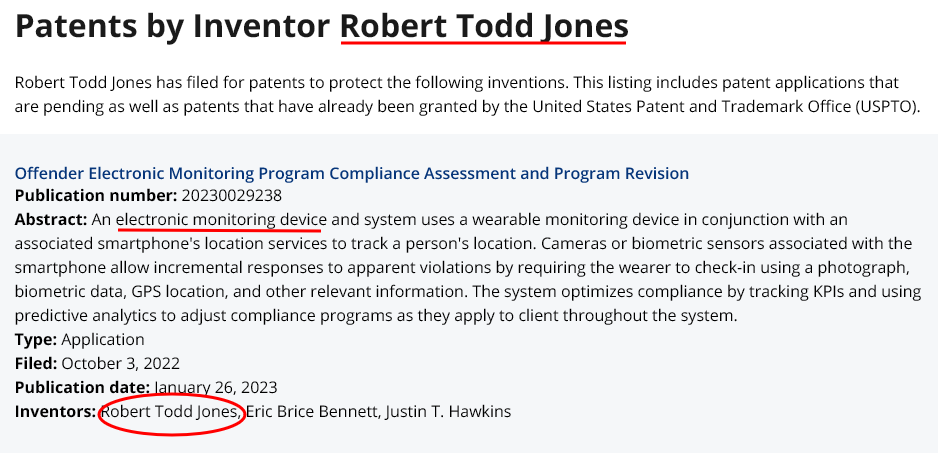

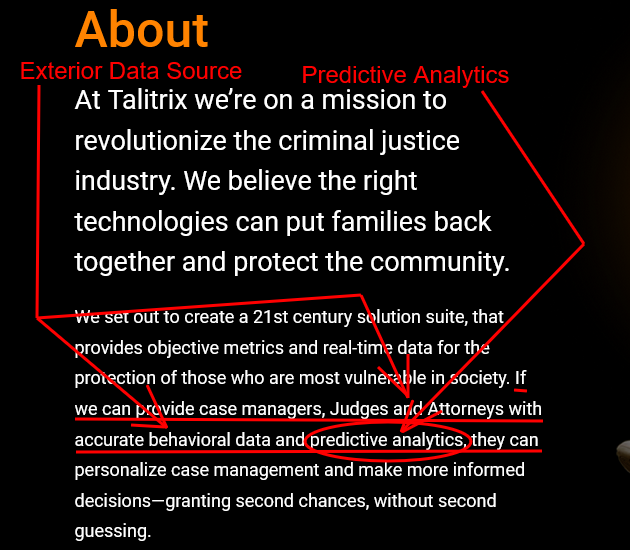





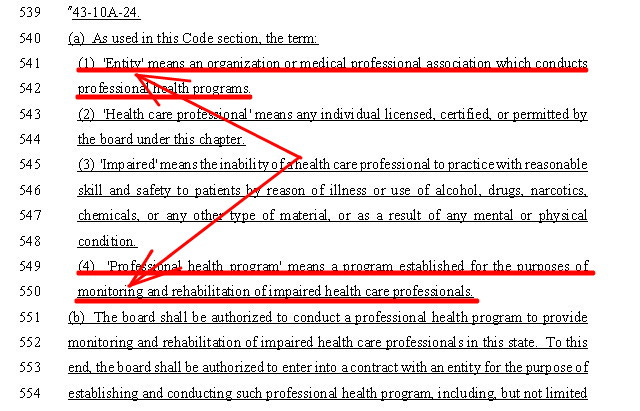
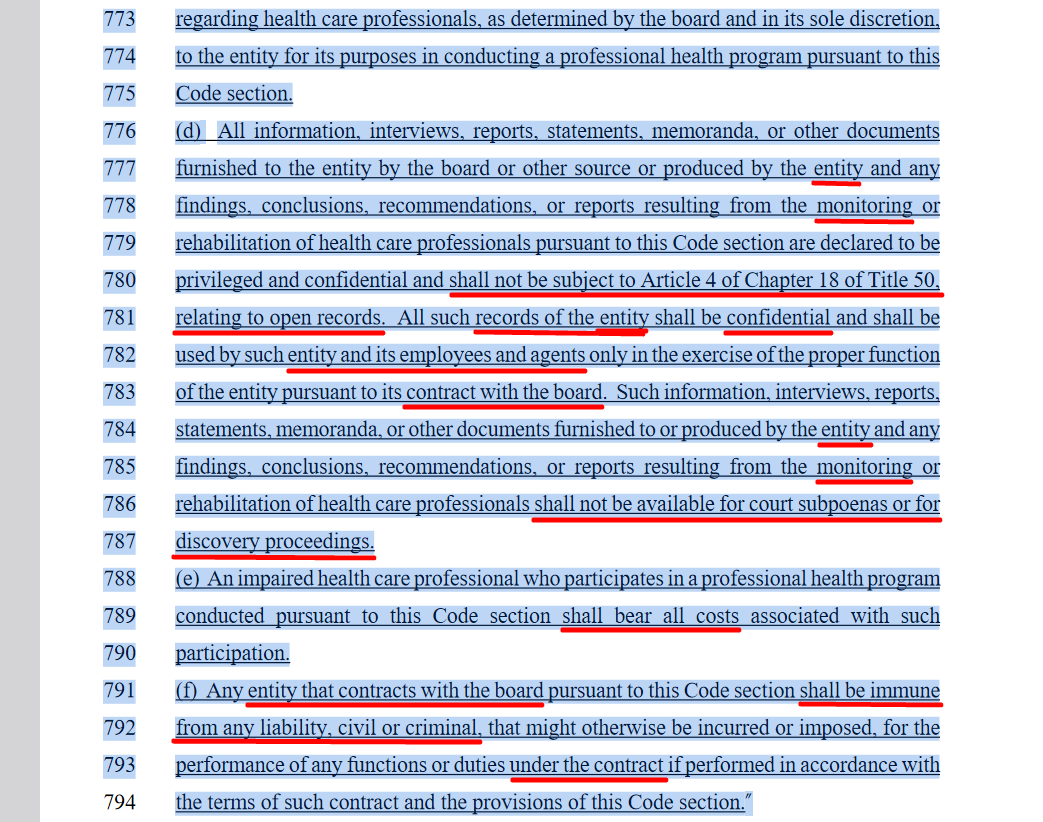
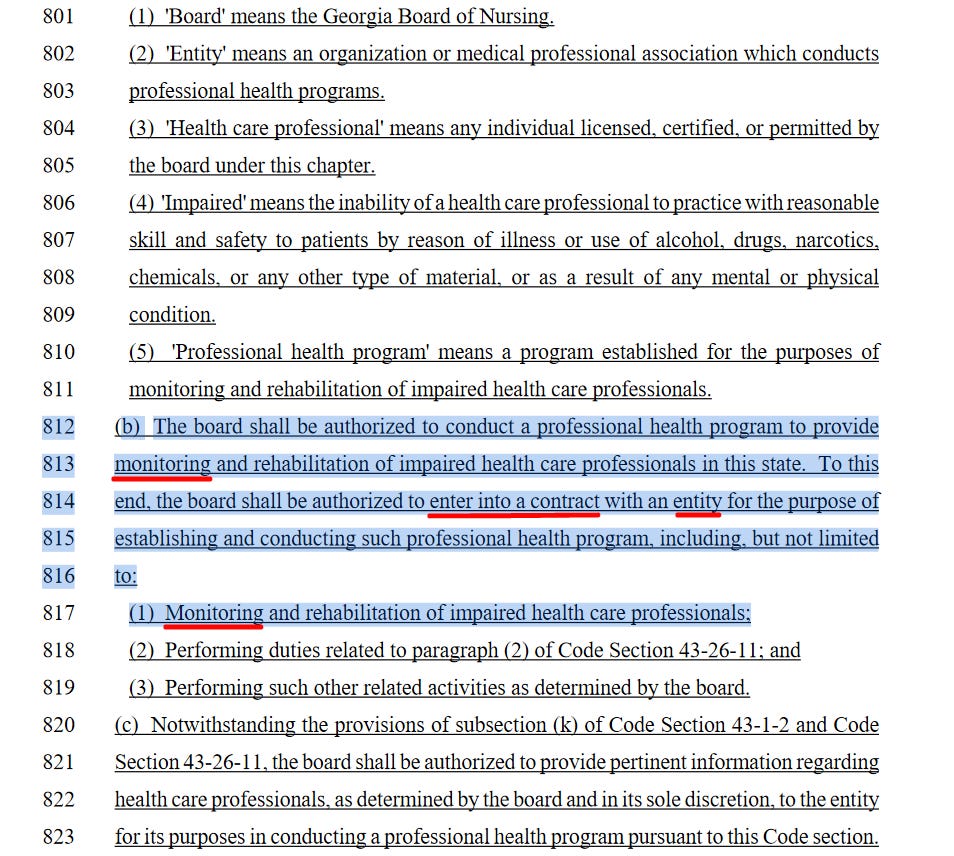
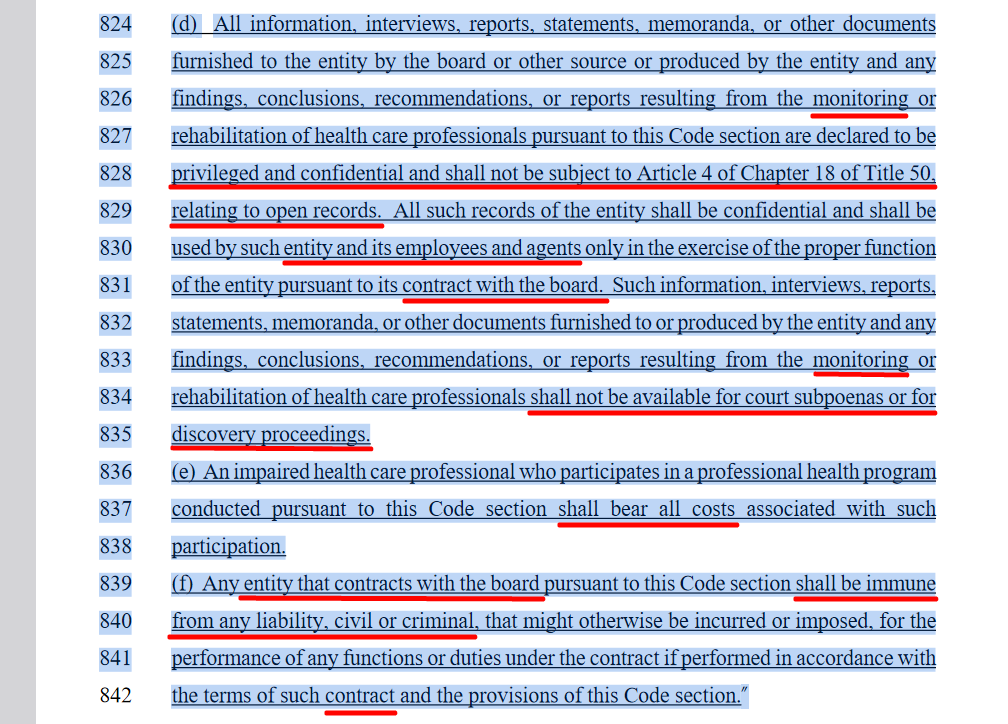
Thank you for following through with the fight against this incredibly deceptive piece of legislation and filing this ethics complaint against one of its sponsors. I have only recently become involved in the workings of our legislature but have quickly realized that our elected officials do not even pretend to work for the benefit of the people. Instead, with the help of legislative teams, lawyers, and lobbyists, they further an agenda that is hidden from us and designed to directly or indirectly benefit them.
HB 520 was tabled, but it is highly likely that it will be resurrected in some way in future sessions. Perhaps formal ethics complaints such as yours will be a deterrent. I will be printing this post as an instruction manual.
THANK YOU! How can I assist you? I have been reading your substack about this and following it. I heard Jones speak last night at the Forsyth County legislative recap, and he glossed over 520, claiming it is very 'misunderstood', but in the same breath talked about the increasing need for technology in healthcare, education, transportation, and infrastructure, including 'wearables', as well as public/private partnerships (which leads directly to fascism, in the true sense of the word). He claimed that Chickfila is a 'technology company selling chicken sandwiches' and that Coke is a 'technology company selling drinks', etc. This is very alarming given his deep financial interest in 'wearable technology'. I appreciated the paragraph in your complaint that talked about other representatives buying in, unbeknownst to them, as my own rep, Carter Barrett, is a shareholder in Talitrix, although he downplays the amount of his investment and his knowledge of what it's all about. The tentacles of this go very deep.
Thank you for your dogged persistence in tracking this down and all the information you have brought to light.